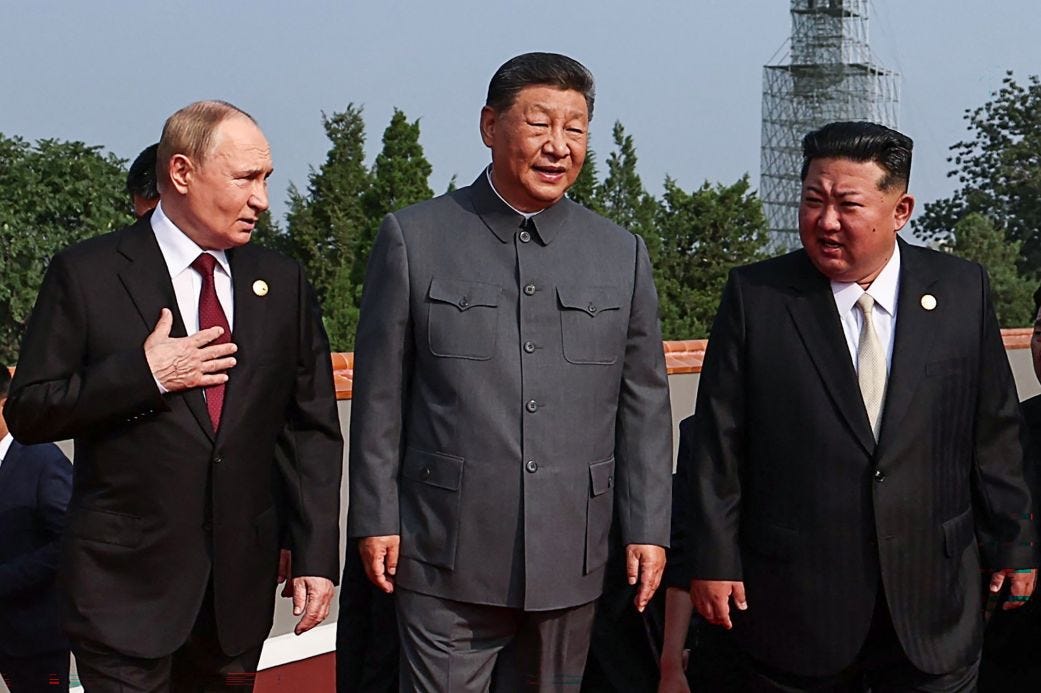Asia Communique — Special Edition
Parade Power, Pipeline Politics: How Beijing is Rewriting Asia’s Strategic Order
Hello Readers,
For today’s newsletter, I’ve brought together insights from Chinese experts on two key developments — Beijing’s recent military parade and the announcement of the China–Russia “Power of Siberia 2” pipeline. The analysts unpack what message Beijing intended to send through the parade and how the pipeline deal fits into China’s broader strategic vision.
This edition is an exclusive compilation, drawing on expert commentary published across multiple Chinese sources over the past 48 hours. This special edition unpacks the September 3 Beijing military parade and the signing of the Power of Siberia-2 gas pipeline agreement — two events that together mark a turning point in China’s regional and global strategy. Featuring insights from Gao Zhikai, Wang Bingzhong, and Zhang Xin, we explore how Beijing is projecting military confidence, energy security, and geopolitical influence simultaneously.
From AI-driven warfare and missile deterrence to energy diplomacy reshaping Eurasia’s gas markets, this edition explains how China is building a comprehensive security architecture — one that ties together hard power, economic leverage, and multipolar governance.
Here are the experts and commentators cited in the newsletter:
1. Gao Zhikai (高志凯)
Position: Chair Professor, Soochow University (苏州大学讲席教授)
Affiliation: Vice Director, Center for China and Globalization (CCG, 全球化智库副主任)
Expertise: International relations, China-U.S. relations, military diplomacy, and global governance.
Background:
A seasoned Chinese academic and policy commentator, Gao specializes in explaining China’s foreign policy narratives to both domestic and international audiences.
Previously worked in the Ministry of Foreign Affairs and served in roles involving China-U.S. diplomacy.
Relevance to Newsletter:
Gao provided the strategic interpretation of the September 3 parade, focusing on military modernization, AI-driven integration, and geopolitical deterrence.
He also discussed China’s relations with the U.S., Japan, Russia, India, and Taiwan.
2. Wang Bingzhong (王炳忠)
Position: Taiwanese Political Commentator and Unification Advocate
Affiliation: Independent political analyst; formerly active in pro-unification circles in Taiwan.
Expertise: Taiwan politics, cross-strait relations, and Chinese nationalism in Taiwan.
Background:
Prominent voice in Taiwan’s “统派” (pro-unification) community.
Former spokesperson of the New Party (新党) in Taiwan, which advocates closer ties with the mainland.
Frequently contributes political commentary to Observer and pro-unification media outlets.
Relevance to Newsletter:
Wang offered on-the-ground observations from the Tiananmen parade.
Emphasized Taiwan’s shared WWII history with the mainland, arguing that the victory against Japan was a collective Chinese achievement.
Warned against “Taiwan independence” narratives and highlighted the risks of overreliance on U.S. security guarantees.
3. Zhang Xin (张昕)
Position: Doctoral Researcher, Chinese Academy of Social Sciences University (CASS, 中国社会科学院大学博士研究生)
Affiliation: CASS, one of China’s top policy research institutions advising the central government.
Expertise: Energy security, Eurasian geopolitics, China-Russia relations, and global energy governance.
Background:
Specializes in energy diplomacy and China-Russia-Mongolia trilateral projects.
Has published multiple analyses on cross-border energy infrastructure and the geopolitical impacts of natural gas pipelines.
Relevance to Newsletter:
Zhang provided the strategic analysis of the Power of Siberia-2 gas pipeline.
Explained how the project reshapes Eurasian energy flows, pricing power in Asia, and the emerging role of Mongolia as an energy hub.
Discussed the impact of RMB-ruble settlement on global energy governance and the broader shift toward a multipolar order.


